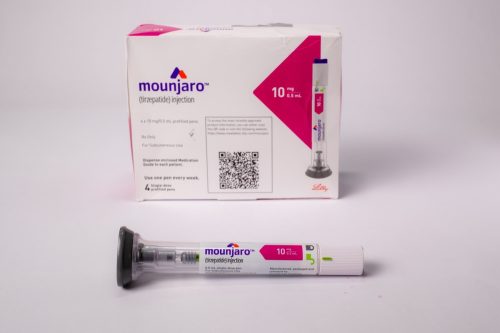New Drug Has People Losing 19% of Body Weight, Research Shows—And It’s Not Ozempic

While weight loss has always been widely discussed, it’s become even more of a hot topic in recent months, thanks to the skyrocketing use of drugs like Ozempic. Indicated for the treatment of type 2 diabetes, Ozempic is often prescribed off-label for weight loss, while other similar drugs—like Wegovy—are actually approved for obesity. Both Ozempic and Wegovy are made by Novo Nordisk, but that’s not the only company developing treatments that yield significant results. Read on to find out more about Innovent, a new drug from Eli Lilly & Co. that has patients losing nearly 19 percent of their body weight.
RELATED: New Drug Has People Losing 60 Pounds on Average, Research Shows—And It’s Not Ozempic.
Innovent can have significant weight loss results.

According to an Oct. 29 press release, results from a new clinical study show that Innovent (mazdutide) can have drastic effects on patients’ weight. Innovent—which is not yet approved by the U.S. Food and Drug Administration (FDA)—targets two receptors, GLP-1R and GCGR, to spur weight loss, according to the press release. This is different from drugs like Wegovy and Ozempic, which only target one hormone (GLP-1).
The study included 80 Chinese patients with obesity, with those involved in the trial taking nine milligrams of Innovent or a placebo. After 24 weeks, patients taking Innovent lost 15 percent of their body weight, or an average of 32.4 pounds (14.7 kilograms), according to results announced in May.
A total of 59 subjects in the treatment and placebo groups agreed to continue the trial for another 24 weeks. After 48 weeks, patients taking Innovent had lost an average of 18.6 percent of their body weight, or 39.2 pounds (17.8 kilograms) of their weight at the beginning of the study.
RELATED: Countries Are Placing New Bans on Ozempic—Could the U.S. Follow?
There were additional benefits, researchers said.

In addition to weight loss, researchers found that the mean waist circumference and the blood pressure of patients taking Innovent decreased. Those on the drug also saw decreases in liver fat content and cholesterol, per the release, indicating broader benefits for people with obesity.
“As a chronic disease with complex causes, obesity is an important risk factor of metabolic diseases, cardiovascular and cerebrovascular diseases and tumors,” leading principal investigator of the study Linong Ji, MD, director of endocrinology and metabolism at Peking University People’s Hospital, said in the press release.
Ji continued, “Obesity requires long-term treatment and management as well as the attention of the entire society. The 48-week results of mazdutide 9 mg in Chinese subjects with obesity revealed robust weight loss efficacy of GLP-1R and GCGR dual agonists, which is at the forefront of the weight loss efficacy of GLP-1 drugs.”
Researchers also noted that no one in the Innovent group stopped treatment due to adverse events over the 48 weeks, and no serious adverse events or increased cardiovascular risk were observed throughout the trial. When it came to side effects, gastrointestinal reactions were the most common, namely nausea, vomiting, and diarrhea, which ranged from mild to moderate severity.
RELATED: Ozempic Patient Reveals “Excruciating” New Side Effect.
Weight loss results are similar to those seen with Mounjaro.

As Jefferies analysts told Bloomberg, the amount of weight lost in this trial is in line with weight lost on Mounjaro (tirzepatide), one of Eli Lilly’s drugs for type 2 diabetes. Mounjaro is expected to be approved for obesity treatment by the end of this year, the outlet reported.
Earlier this month, Eli Lilly released results from the phase 3 SURMOUNT-3 clinical trial, which evaluated Mounjaro’s effectiveness for weight loss. Per an Oct. 15 press release, following a 12-week diet and exercise period, patients taking Mounjaro lost over 60 pounds, or 26.6 percent of their body weight, over 84 weeks.
The drug is part of ongoing studies.

In addition to the present study—which is a phase 2 trial—there are several other trials underway to study the efficacy of lower doses of Innovent, including four and six-milligram doses.
The final phase of study for the nine-milligram dose is anticipated to start at the end of this year. After the pre-marketing clinical trials are finished, Innovent is expected to be submitted for FDA approval.
RELATED: For more up-to-date information, sign up for our daily newsletter.
Best Life offers the most up-to-date information from top experts, new research, and health agencies, but our content is not meant to be a substitute for professional guidance. When it comes to the medication you’re taking or any other health questions you have, always consult your healthcare provider directly.